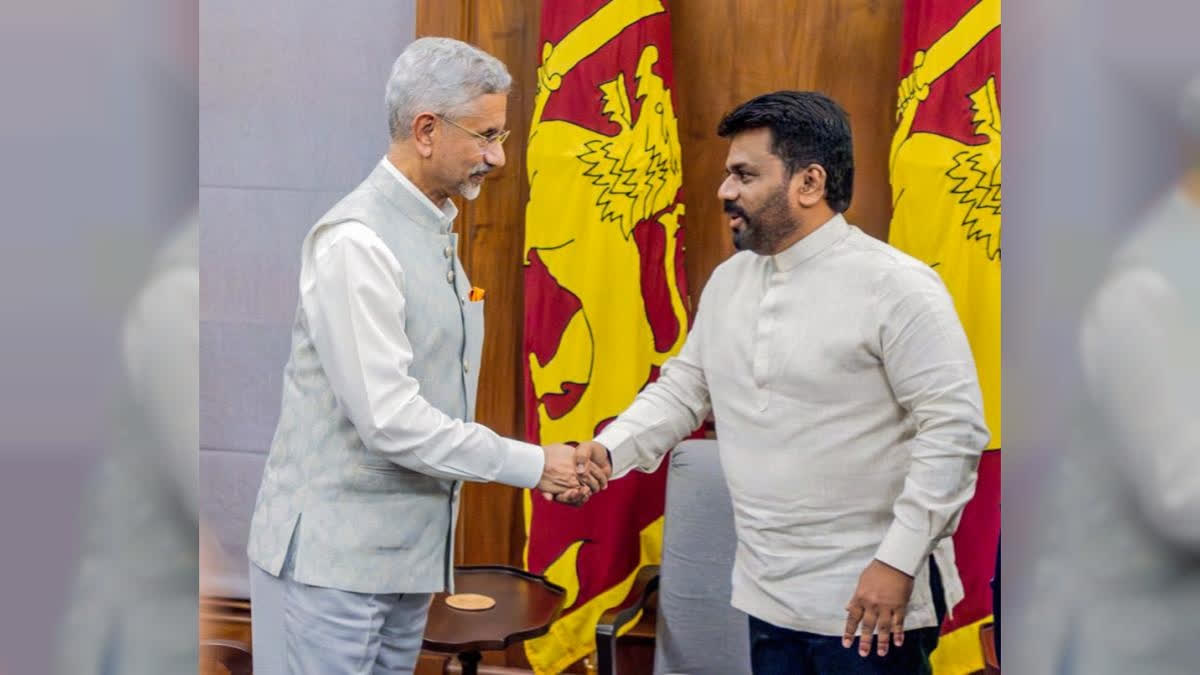New Delhi: In what can be seen as an example of how India can keep bilateral ties with a neighbouring country balanced even if there is a regime change in that country, External Affairs Minister S Jaishankar held a cordial meeting with new Sri Lankan President Anura Kumara Dissanayake during the course of a daylong visit to Colombo on Friday.
In the process, Jaishankar became the first foreign minister from any country to meet Dissanayake after the latter assumed office last month.
“Pleased to receive Indian External Affairs Minister @DrSJaishankar today, during his official visit to Sri Lanka," Dissanayake posted on his X handle following the meeting. "Discussions focused on boosting cooperation in multiple sectors. Dr. Jaishankar reaffirmed India's support for Sri Lanka's economic recovery. The importance of continued bilateral collaboration mutually beneficial issues was also discussed."
According to a statement issued by the Ministry of External Affairs, during his meeting with Dissanayake, Jaishankar spoke about ongoing initiatives in the field of energy production and transmission, fuel and LNG supply, solar electrification of religious places, connectivity, digital public infrastructure, health and dairy development.
"He highlighted that they would contribute to economic sustainability and provide new streams of revenue," the statement reads. "The Sri Lankan President said that India's economic support is critical to realise his vision of a prosperous Sri Lanka and meeting the aspirations of the people. He referred to the potential of export of renewable energy to India, which could help reduce production costs in Sri Lanka and create additional resources. The President also noted the contribution of Indian tourists and recognised that this has the potential to grow further."
Prior to meeting Dissanayake, Jaishankar held wide-ranging and detailed talks with his new Sri Lankan counterpart Vijitha Herath. The Ministry stated that, during the meeting, Jaishankar conveyed India's strong commitment to advance bilateral cooperation based on its Neighbourhood First Policy and SAGAR (Security and Growth for All in the Region) outlook. In this context, he assured that India's ongoing development assistance to Sri Lanka through projects of Sri Lankan priority will be continued.
Jaishankar also held a meeting with new Sri Lankan Prime Minister Harini Amarasuriya during the course of which he underlined that the Government of India was prepared to respond to the training and capacity building requirements of Sri Lanka. Their discussion also focused on the benefits of digital public infrastructure.
That New Delhi has managed to keep bilateral ties with Colombo on an even keel is evident from reports emerging in the Sri Lankan media that Dissanayake might make his first overseas official trip after assuming office to India. Jaishankar extended to Dissanayake an invitation on behalf of Prime Minister Narendra Modi to visit India at a mutually convenient time. The Daily Mirror, citing sources, reported that Dissanayake is expected to follow in the footsteps of his predecessors and make New Delhi the destination of his first bilateral visit after the parliamentary elections in the Indian Ocean island nation scheduled for November 14.
Jaishankar's visit to Sri Lanka has largely put doubts about how to deal with a completely new entity that has assumed power in Sri Lanka at rest. Dissanayake is the leader of the Janatha Vimukthi Peramuna (JVP), a leftist political party that is the main component of the NPP alliance. Dissanayake had won the presidential election representing the NPP alliance. He is Sri Lanka's first president to be elected from a third party other than the two major political parties dominating the country's political landscape.
The India-Sri Lanka relationship has traditionally been marked by bonhomie and a legacy of cultural, religious and linguistic interaction. Trade and investment have grown and there is cooperation in the fields of development, education, culture and defence.
Sri Lanka is one of India's major development partners and this partnership has been an important pillar of bilateral ties between the two countries over the years. With grants alone amounting to around $570 million, the overall commitment by the Government of India is to the tune of more than $3.5 billion.
When Sri Lanka was faced with an unprecedented economic crisis in 2022, India provided around $4 billion worth of aid. India also played a crucial role in collaborating with the International Monetary Fund (IMF) and creditors to help Sri Lanka restructure its debt.
Located close to India’s southern coast, Sri Lanka is of huge geostrategic importance for India. India has been expressing concerns about China's growing economic and strategic influence on Sri Lanka, including Chinese investments in infrastructure projects and the development of the Hambantota Port. India has been trying to keep China away from a region New Delhi sees as to be under its sphere of influence.
India's keeping bilateral ties with Sri Lanka largely intact despite a regime change is in sharp contrast with how the India-Maldives relationship deteriorated following the election of Mohamed Muizzu, seen as pro-China, as President of the Indian Ocean archipelago nation last year. Muizzu had won the presidential election on a pronounced 'India Out' campaign. After assuming office, he ensured the withdrawal of a handful of Indian security personnel deployed in the Maldives primarily to operate some India-supplied aircraft for emergency medical evacuations.
